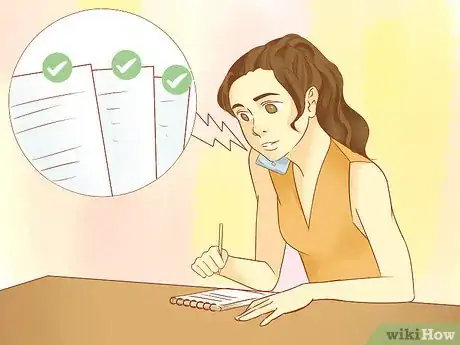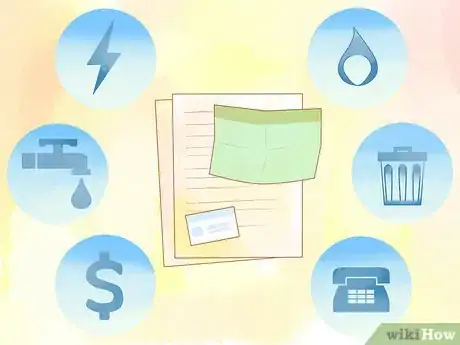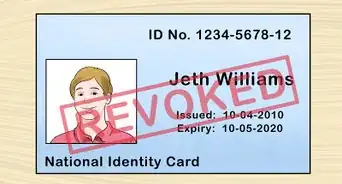This article was co-authored by Clinton M. Sandvick, JD, PhD. Clinton M. Sandvick worked as a civil litigator in California for over 7 years. He received his JD from the University of Wisconsin-Madison in 1998 and his PhD in American History from the University of Oregon in 2013.
This article has been viewed 432,519 times.
Proving residency will demonstrate that you a resident of a certain location or state. This can be necessary to prove your eligibility for certain benefits, programs or classifications in that area. To register to vote, you may only be required to bring a utility bill that contains your address, but you need to prove at least one year of residency to receive resident tuition at most colleges and universities. Make sure your home address is listed on all evidence of residency.
Steps
Discovering the Local Requirements
-
1Determine the specific requirements. There are some common ways to prove residency, but the types of proof vary greatly from state to state, and across different organisations. The first thing to do is research the particular requirements that are relevant to you. Look on the website of the state, school or other organisation you need to prove your residency to.
- If you are struggling to find the information on a website, it can be quicker and easier to phone up directly or go into a local office or city hall.
- There is an online database that provides details of state requirements for different universities and colleges that you can use.
- Often you will find that residency requirements are indicated within the state statute. You can search for state statutes online.[1]
-
2Identify commonly used identification. Some of the most commonly accepted proofs of residency include a dated utility bill which includes your name and address, or a tenancy agreement with your full name and all the information about how long you have lived in your current address. In some cases a tenancy agreement may need to be notarized. A valid voter registration card for that state may also be accepted as a proof of residency.
- In all cases you will need to provide more than one proof of residency, often two, and sometimes four.
- It is best to have at least two government issued pieces of evidence to use to prove residency.[2]
- If you are using a utility bill, bring one from a year ago and one from within the last month so you can demonstrate long-term and current residency.
- A utility bill could be water, electric, gas, garbage, bank statement or landline phone service.
Advertisement -
3Know which forms of identification are rarely accepted. Just as there are proofs which are commonly accepted across states, there are documents which are rarely accepted that you should make yourself aware of. Fishing and hunting licenses may not be accepted, as well as cellular phone bills and pay stubs. Personal mail that is not a utility bill or from a government agency is unlikely to be accepted as proof residency.
- You should always remember to check with your local requirements as some of these documents are accepted in some states.
- If you are unable to research the requirements in advance, it's prudent to bring as many items as possible when you go to apply to give yourself the best chance.
Proving Residency For College
-
1Contact the college to which you want to apply. One common instance in which people need to prove residency is when they are applying to study at college. The requirements will vary so you have to start by asking the financial aid office how long you must reside in the state to be eligible for in-state tuition. Most state colleges require one year of residency, but others only require three to six months. Use the online list to find your college.[3]
-
2Clarify your residency before your enrolment date. You should be sure to have your residency situation clarified with your college well in advance of the start of the semester. This will mean you can avoid stress and problems with fees when you are beginning college. If you haven't proven your residency by the date of your enrolment you may have to pay non-resident tuition fees.
-
3Know what else affects your claim. The most important thing is to provide the official required documentation for your state or college, but there are other ways to demonstrate an intention to establish residence. For example, opening a local bank account, registering a vehicle in the state, or getting a local library card, are all ways of indicating your intention to remain.
- These are not substitutes to the official requirements, but you can use them to supplement and strengthen your claim.[4]
-
4Understand what may harm your claim. As well as considering your residency and ties to the state you are applying in, you should be aware that your relationship to another state can be taken into consideration. If you have demonstrably strong ties to another state this may harm your claim to residency in the state you are applying in.
- For example, if you own a house in another state, have a driver's license or are registered to vote in a different state, the assessor may question your intention to maintain or establish permanent residency.
- These are not conclusive factors, but should be taken into account.[5]
Writing an Affidavit of Residency
-
1Understand what an affidavit is. In some instances you may be required to produce a written affidavit of residence to go along with the other forms of proof you are submitting, such as a utility bill or government issued ID card. An affidavit is an official statement from you which is made under oath, or is attested to under penalty of perjury, that certifies your residency. That means that this is a legal document, which if faked, can lead to a prosecution.[6]
-
2Write an affidavit of residency. For an affidavit of residence you will typically need to write your address, state that you are a full-time resident, and say when your residency began. There are templates available online which give you the essential outline of an affidavit of residency.
- An example of the text could be: "I, the undersigned (full legal name) hereby certify that I live at (address) and have been resident there since (date residency began)."[7]
- You need to use your full legal name in the affidavit.
- Write it in a formal style and ensure it is presented clearly and professionally.
-
3Get the affidavit notarized. Often you will be required to get the affidavit notarized before it is accepted as proof of residency.[8] A Notary Public is an independent individual who verifies that you have signed the affidavit and it is genuine. You will find notaries in local government offices and mailing counters. You can search online for notaries operating near you.
- When you go to the notary you will need to bring identification with you so be sure you know what to bring before you go.
- Don't sign the affidavit before you go, your notary needs to witness you doing this.
Things You'll Need
- Government-issued photo ID
- Residential lease/property deed
- Utility bill
- Letter from the government/court (marriage license, divorce, government aid)
- Bank statement
- Driver’s license/learner’s permit
- Car registration
- Notarized affidavit of residency
References
- ↑ http://www.finaid.org/otheraid/stateresidency.phtml
- ↑ http://www.finaid.org/otheraid/stateresidency.phtml
- ↑ http://www.finaid.org/otheraid/stateresidency.phtml
- ↑ http://www.finaid.org/otheraid/stateresidency.phtml
- ↑ http://www.finaid.org/otheraid/stateresidency.phtml
- ↑ http://www.free-legal-document.com/affidavit-of-residence.html
- ↑ http://www.free-legal-document.com/affidavit-of-residence.html
- ↑ http://www.free-legal-document.com/affidavit-of-residence.html
About This Article
If you need to prove your residency, keep in mind that different organizations have varying requirements for what you'll need to provide. Generally though, you'll need to provide 2 different documents, like a bill or letter addressed to you, although sometimes as many as 4. Look for a dated utility bill which includes your name and address from the past year. You can often use a bank or phone statement or a copy of your tenancy agreement too. Some places also accept a valid voter registration card as proof of your residency. For more tips from our Legal co-author, including how to write an affidavit of residency, read on!







































































